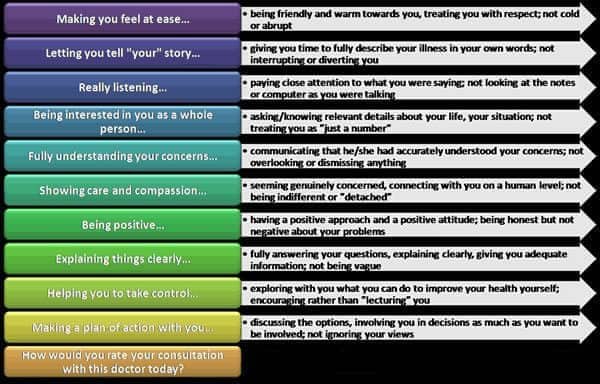MRCGP & GP Training
The PSQ (Patient Satisfaction Questionnaire)
What is the PSQ?
The PSQ provides useful feedback to doctors by providing a measure of the patients’ opinion of the doctor’s relationship and empathy during a consultation.
The evidence provided is useful in helping trainer and trainee to address needs and facilitate educational shift during the training period.
The PSQ is designed to ask patients of their experience with you. In particular it asks the patient how good the doctors was at the things listed on the right.

How do I arrange getting the MSF done?
- The forms and letters of explanation should be handed to consecutive patients (irrespective of their likelihood of responding) by the receptionist, continuing into subsequent days if necessary.
- Patients complete the forms and hand back to receptionist. This should continue until 40 completed forms have been returned
- The results need to be entered online (usually by a practice admin person)
- Receptionist and trainer complete the declaration form and return to Deanery
- Once everything is submitted, results are sent to the Educational Supervisor. Results will include mean, median and range for each question. Results are anonymous.
- The Educational Supervisor familiarises him/herself with the feedback prior to the interview and aims to assimilate the numerical scores within the context of the trainee’s overall performance.
- The feedback discussion should centre around the trainee’s expectations in relation to the mean, median and range for each question.
Any top tips for the PSQ?
- Read, familiarise and make sure you understand each of the components above. Ask your trainer for clarification on any points which raise concern or you are unsure of.
- All these components are elements of good communication skills. Therefore we recommend getting the following communication skills book and practising the skills within it: Skills for Communicating with Patients by Jan Van Dalen, Jonathan Silverman, Suzanne Kurtz, and Juliet Draper (the yellow book, not the green one)
- You need to practise communication skills in order to ensure most of your patients are happy. We want our patients to be happy. Why else did we sign up to becoming doctors? Surely we wanted to HELP people and make them feel better. So there is really no need to be Dr. Grumpy Pants or Dr. Bow Before-Me. Achieving a harmonious relationship also betters patient concordance. If you make patients as human beings who are equal to you, then you can stop worrying about what they might tick on the form. Practising communication skills will build your foundations in these skills thus making you a great doctor who is like by most of your patients. Imagine how good that feels.
- Finally, use the structured review form (in downloads section above) to help you reflect on your patient satisfaction survey . Don’t forget to bring this with you to the next Educational Supervision meeting and upload it to your ePortfolio.

